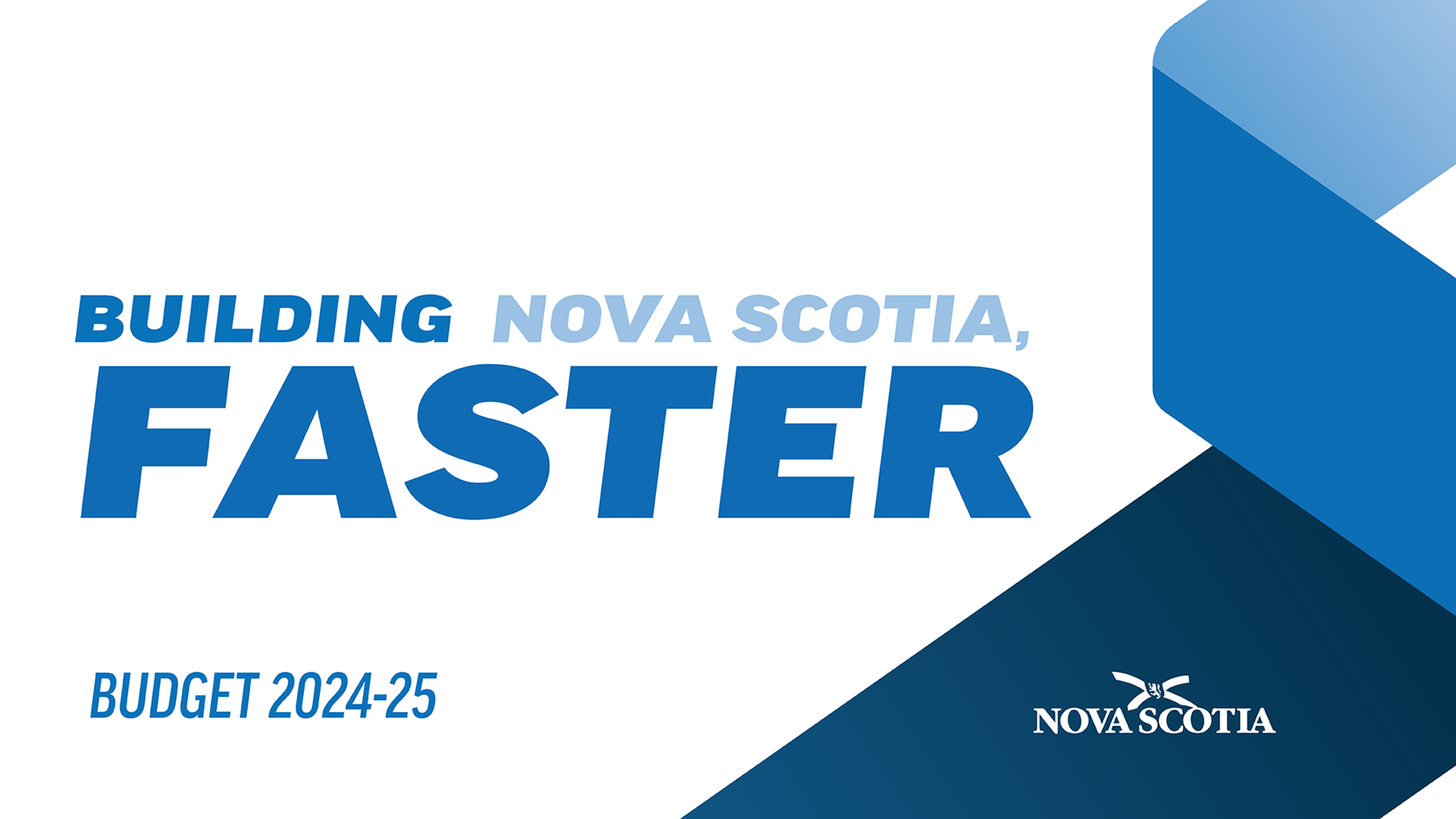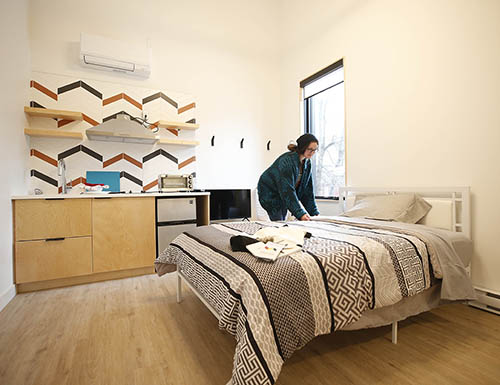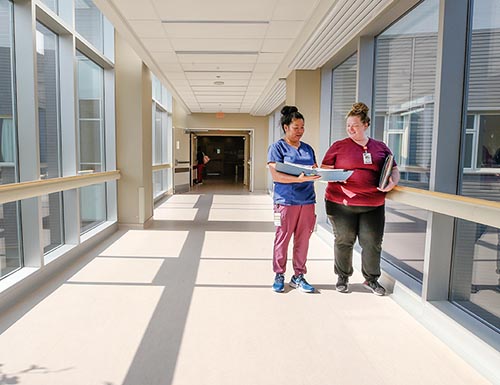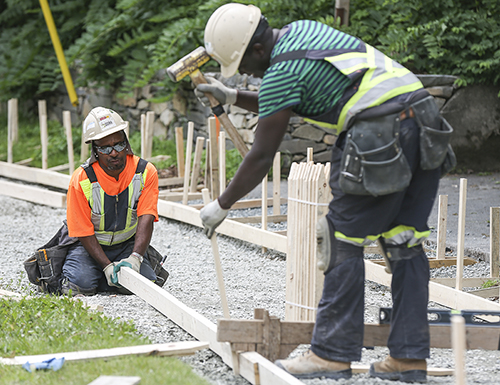Budget 2024 to 2025

We are building Nova Scotia, faster.
Budget 2024–25 builds on the work the Province has already started and sets a path for the year ahead that we can afford.
It invests more to help Nova Scotians with the cost of living and build more diverse and resilient communities. It invests in building a world-class healthcare system that provides more care, faster. And it invests in building a skilled workforce with the people we need to create more housing, provide healthcare and drive a healthy economy.
With revenues of $15.8 billion and expenses of $16.5 billion, Budget 2024–25 is estimating a deficit of $467.4 million (after consolidation and accounting adjustments).
Supporting Nova Scotians and Building Communities
We’re building communities so that Nova Scotians have the quality of life and sense of belonging they deserve. Not everyone is experiencing the same challenges, so we are supporting Nova Scotians in a variety of ways that will make a difference.
Helping Nova Scotians with the Cost of Living
We are building on our investments to help Nova Scotians stretch their household budgets even more.
- Beginning January 1, 2025, indexing personal income tax brackets, the basic personal amount and certain non-refundable tax credits to Nova Scotia’s inflation rate. It will be the largest tax break in the province’s history and will save Nova Scotians about $150- $160 million per year in taxes by 2028.
- $7.8 million more for additional actions to reduce child poverty, including:
- delivering the increased Nova Scotia Child Benefit
- more support for young people leaving care at the age of 19
- expanding the EDGE Program, which prepares youth at risk for education and employment success
- $2.4 million more to create 500 new rent supplements, for a total of $69.2 million to help 8,500 households
- $5 million more, for a total of $23.8 million, for the Home Repair and Adaptation Program to help more low-income homeowners
- $1.2 million for the Fertility and Surrogacy Tax Credit to help offset costs of fertility and surrogacy related expenses
- $3.2 million for the Children’s Sport and Art Tax Credit of $500 to support children participating in sports and arts programs
- $26.5 million this year to provide the Seniors Care Grant to help older Nova Scotians stay in their home and communities
- $18.2 million to return provincial income taxes paid by more than 10,000 seniors who also receive the Guaranteed Income Supplement
- $1.2 million more, for a total of $10.4 million, for the Property Tax Rebate, which offers eligible seniors a rebate of half of their property taxes, up to $800
- $60.9 million for about 200,000 families through the Affordable Living Tax Credit
- $144.2 million for the Your Energy Rebate Program to eliminate the 10% provincial HST on home heating
Giving Children a Strong Start
This budget invests in Nova Scotia’s children who deserve to have a strong start.
- $18.8 million this year to launch a new lunch program for students in the public school system. The program will roll out over four years and build to an estimated $100 million annual investment by 2027–28
- $28 million more for our public schools to address growing enrolment, hire more teachers and address inflationary pressures
- $1 million for Cape Breton University’s accelerated and expanded teacher training
- $42.5 million more this year in child-care funding to lower fees for families, create more spaces and enhance after school care, fully recoverable from the Canada-Wide Early Learning and Child Care Agreement
- $208.5 million to build and renovate schools across the province, including $30 million for capital repairs and $40 million for new modular learning spaces (Capital Plan)
- $12.3 million more to pay early childhood educators more and help stabilize and grow the workforce across the province
- $5.1 million more to increase rates and provide additional supports to foster children and their families, bringing the total annual funding to $16.7 million following the redesign initiative
- $5.8 million more to support the redesign of provincial preschool autism services
- $1.4 million more for Nova Scotia Hearing and Speech to significantly reduce wait times among preschoolers
Helping Nova Scotians Meet Their Needs
With the significant investments made over the past two years, Budget 2024–25 will help to build resilient communities and make a positive impact for as many people as possible.
- $84.6 million for initiatives under the Supportive Housing Action approach and other programs to address homelessness, including:
- more supportive housing units
- new supportive housing locations throughout the province
- operational funding for shelter service providers
- 100-bed shelter in Dartmouth
- 70-bed shelter in Halifax
- a new shelter exclusively for 2SLGBTQIA+ clients in Halifax
- emergency shelter and support services for youth
- $102.3 million to take action on the Human Rights Remedy by making significant changes within the Disability Support Program and helping people with disabilities to better meet their needs, including:
- $53.3 million to deliver the new Income Assistance Disability Supplement – an additional $300 per month to about 15,000 people on income assistance who are not in the Disability Support Program
- expanding community-based programming and individualized funding
- adding new positions in the Disability Support Program to support clients and the implementation of changes related to the Remedy
- supporting the transition and implementation of the Remedy
- expanding and modernizing the technology used in the Disability Support Program
- $16.4 million to support persons with disabilities living in institutions to transition into the community
- $7 million more to transition young adults with disabilities out of long-term care into the community
- $850,000 to raise the earned income exemption for Income Assistance clients
- $7.1 million more, for a total annual budget of $16.9 million, to provide increased, permanent funding for Transition Houses and Women’s Centres in response to the Mass Casualty Commission recommendations
- $2 million more, for a total of $2.5 million, for the Community Housing Growth Fund
- $2.8 million under the Action for Health plan to continue improving equity across the healthcare system
- $1.2 million for the Equity and Anti-Racism Strategy to support communities to address inequity and racism across the province
- Implement the Province’s first African Nova Scotian Justice Action Plan and advance collaborative work on an Indigenous Justice Action Strategy
Action for Healthcare
We continue our work to transform healthcare in 2024–25. The Action for Health plan is our roadmap to build a world-class healthcare system that provides more care, faster. Everything in our plan has been started. We are doing more, faster.
Budget 2024–25 invests a total of $7.3 billion across our healthcare system, giving us the resources to continue making the kind of changes that will have a lasting positive impact system-wide. It includes brand new support for Nova Scotians with diabetes, more support for cancer care, and investing in a modern healthcare system that can meet the demands of a growing population. We’re addressing long-standing generational health issues and investing in wellness and wellbeing.
Building on our Actions for Healthcare
Healthcare spending has increased by $1.9 billion or 36% over the past three years, reflecting significant action already to build the workforce, programs, beds, buildings, equipment and systems to deliver the care Nova Scotians have been waiting for. We are making progress, and more will be happening this year.
- $360.7 million more for Nova Scotia Health and IWK Health to deliver their programs and services to a growing population
- $184.3 million more to continue progress on the Action for Health plan, including:
- $59.2 million for primary healthcare initiatives, including the development of chronic disease care pathways and continuing to expand access to care options
- $19.8 million for initiatives to move patients through the healthcare system more quickly
- $19.6 million for cancer care and precision medicine improvements, including implementing an “at home” cancer care program and advancing Spinal Muscular Atrophy screening
- $11.3 million for improved access to surgeries by continuing to shorten the surgical and diagnostic waitlists
- $9.2 million for public health initiatives with a focus on early years and oral health programs
- $8 million for emergency care initiatives
- $36.2 million more for initiatives that move the province toward universal mental health and addictions care for all Nova Scotians. This includes investments in new and expanded services and supports, including:
- $10 million to establish an insured services program to support the delivery of publicly-funded mental health and addictions care – a Canadian first
- $6.7 million more for community-based organizations to support the delivery of mental health, addictions and wellness services
- $7.6 million to grow and strengthen the province’s mental health and addictions workforce
- $41.5 million to improve cancer care treatment with new digital imaging technology and equipment that provides adaptive radiation treatment, resulting in improved outcomes and increased survival, as well as to establish a new Varian office in Nova Scotia as part of the 10-year Multidisciplinary Oncology Partnership Agreement
- $7.2 million to support Nova Scotians with diabetes, including $5.9 million for coverage of glucose monitors and $1.2 million to expand the insulin pump program
- $9.6 million more for direct benefits to help more people receive the care and support they need to stay home or return home following a hospital stay
- $9.6 million toward the plan to build 5,700 new and replacement long-term care spaces by 2032
- $4.7 million to provide long-term care homes with more funding for their food budgets
- $10.7 million more to help long-term care homes move toward the 4.1 hours of care standard
- $35.5 million to fund about 350 temporary and permanent long-term care spaces for people waiting to move from acute care to long-term care
- $10.5 million for investments in clinical digital workspaces in healthcare
- $75.6 million to continue building One Person One Record to enable a digitally supported patient-centered health system
Building the Healthcare Workforce
This budget builds on the tremendous work already started to recruit, retain and train more healthcare professionals.
- $48 million more for workforce strategies under the Action for Health plan
- $1.8 million for bursary incentives to encourage more people to enter the Primary Care Paramedic program
- $887,000 for training emergency medical responders, a new role that will improve wait times and access to emergency care
- $1.8 million this year for the Acadia University nursing program, a satellite of Cape Breton University
- $637,000 more to continue the expanded nursing training programs, as part of a four-year commitment to add 80 seats for nursing students at Cape Breton University, Dalhousie University and St. Francis Xavier University
- $1.7 million more to continue supporting the expansion of 120 permanent seats and the one-time expansion of 180 seats in the NSCC Practical Nursing program
- $1.9 million for this year’s commitment to continue training medical laboratory technicians through Michener Institute of Education
Building Our Healthcare Infrastructure, Faster
Capital Plan 2024–25 includes $579 million to advance new healthcare redevelopment projects and fund other projects that will improve the healthcare system.
- $301.7 million for Halifax Infirmary expansion and Cape Breton Regional Municipality healthcare redevelopment projects
- $16.5 million for transition-to-community centres
- $108.3 million for construction and renewal of other hospitals and medical facilities, including projects in Amherst, Pugwash, Bridgewater, Yarmouth and the IWK Health Centre
- $32 million to repair and replace medical equipment
- $22 million to repair and replace medical facilities
- $20.2 million for various Action for Health plan capital initiatives
Building a Skilled Workforce for More Housing and a Healthy Economy
Budget 2024–25 is helping to build a healthy, clean economy and position our province for successful, sustainable growth. We continue to strengthen how we deliver economic development and the workforce our growing province needs. We are building communities and connecting people to programs, services and opportunities.
A Skilled Workforce
Nova Scotia needs more people to work in the in-demand jobs of today and the economy of tomorrow, so we are taking action to train more people here and attract the talent employers are looking for.
- $46.4 million this year to make progress on the province’s $100 million plan to grow the skilled trades workforce over the next three years
- $671,000 to increase participation and retention of women working in the skilled trades and to help advance women in their apprenticeships, in partnership with the federal government
- $340,000 more for year three of a four-year $13-million commitment to create up to 3,200 additional paid internship opportunities for post-secondary students through Mitacs
- $27.2 million for the More Opportunity for Skilled Trades (MOST) tax refund program for workers under the age of 30 in high-demand occupations, including skilled trades, film and video occupations. Starting in the 2023 tax year, MOST is expanding to include eligible nurses.
- $8.6 million this year for community-based settlement service organizations that support newcomers
More Housing, Faster
Our growing province needs more housing now, so we are taking important steps to increase the housing supply.
- $80-$100 million estimated annually to rebate the 10% provincial HST on the new construction of purpose-built, multi-unit apartments
- $27.1 million for NSCC student housing projects at various stages of development (Capital Plan)
- $14.8 million this year for Nova Scotia projects to leverage funding from the National Housing Strategy 2022-25 Action Plan
- $5 million to expand the $28.6 million Affordable Housing Development Program to include student housing project proposals
- $3.6 million for a rapid housing initiative to develop new affordable housing units in Halifax
- $35.3 million to build new public housing units and for more repairs and maintenance to existing public housing (Capital Plan)
- $11.8 million for a new investment in modular public housing (Capital Plan)
Strategic Infrastructure for a Growing Economy
We are making strategic investments in building our communities and connecting people to the programs and services they rely on.
- $15 million this year, as part of a $47.3 million three-year commitment, to launch a new Cellular for Nova Scotia Program to expand access to cellular service across the province
- $5.5 million more for investments in cyber security
- $36 million for the Rural Impact Mitigation program (RIM) for the maintenance and repair of rural roads
- $55 million for gravel roads (Capital Plan)
- $483.3 million for major 100-series highway construction projects, and repaving and structure work (Capital Plan)
Building a Clean, Healthy Economy
We continue to invest in areas that help to build a stronger, cleaner economy and reach our climate change goals, which will benefit Nova Scotians for generations to come.
- $36.7 million this year for various actions to advance Nova Scotia’s Climate Change Plan for Clean Growth, including:
- $3 million to develop a Clean Energy Fund to support more Nova Scotia communities to complete clean energy projects
- $3 million to invest in the Clean Fuels Fund to support industries and businesses to adopt low-carbon and renewable fuels such as green hydrogen, renewable natural gas, biofuels and sustainable biomass
- $1 million more to strengthen responses to coastal and inland flood risk
- $1.3 million more to allow more farmers to adopt clean technologies for sustainable farming
- $650,000 to support climate change vulnerability assessments and adaptation plans for important fisheries and aquaculture infrastructure
- $1.3 million to invest in the Fisheries and Aquaculture Energy Efficiency Innovation Fund and a Climate Change Adaptation fund to help the sector reduce energy use and prepare for climate change
- $5.4 million to increase the amount of renewable energy by building at least 500 megawatts of new local renewable energy by 2026 and 50 megawatts of new community solar energy
- $1.5 million to advance the Green Hydrogen Action Plan through public engagement and increase awareness about renewable energy opportunities
- $1.8 million more for ecological forestry implementation
- $8.3 million as part of a multi-year plan to upgrade the dykeland system in support of Nova Scotia’s agriculture sector (Capital Plan)
- $5.5 million more, for a total of $23.4 million, for the Payroll Rebate Program, which provides incentives to attract innovative companies to the province and create jobs
- $12 million for the Innovation Rebate Program, which provides incentives for businesses to invest in their operations and become more innovative, productive, competitive and sustainable
- $14.1 million for the Capital Investment Tax Credit, a refundable corporate tax credit that can be claimed for capital equipment and property for use in Nova Scotia and recently expanded to include emerging sectors like aerospace and manufacturing



